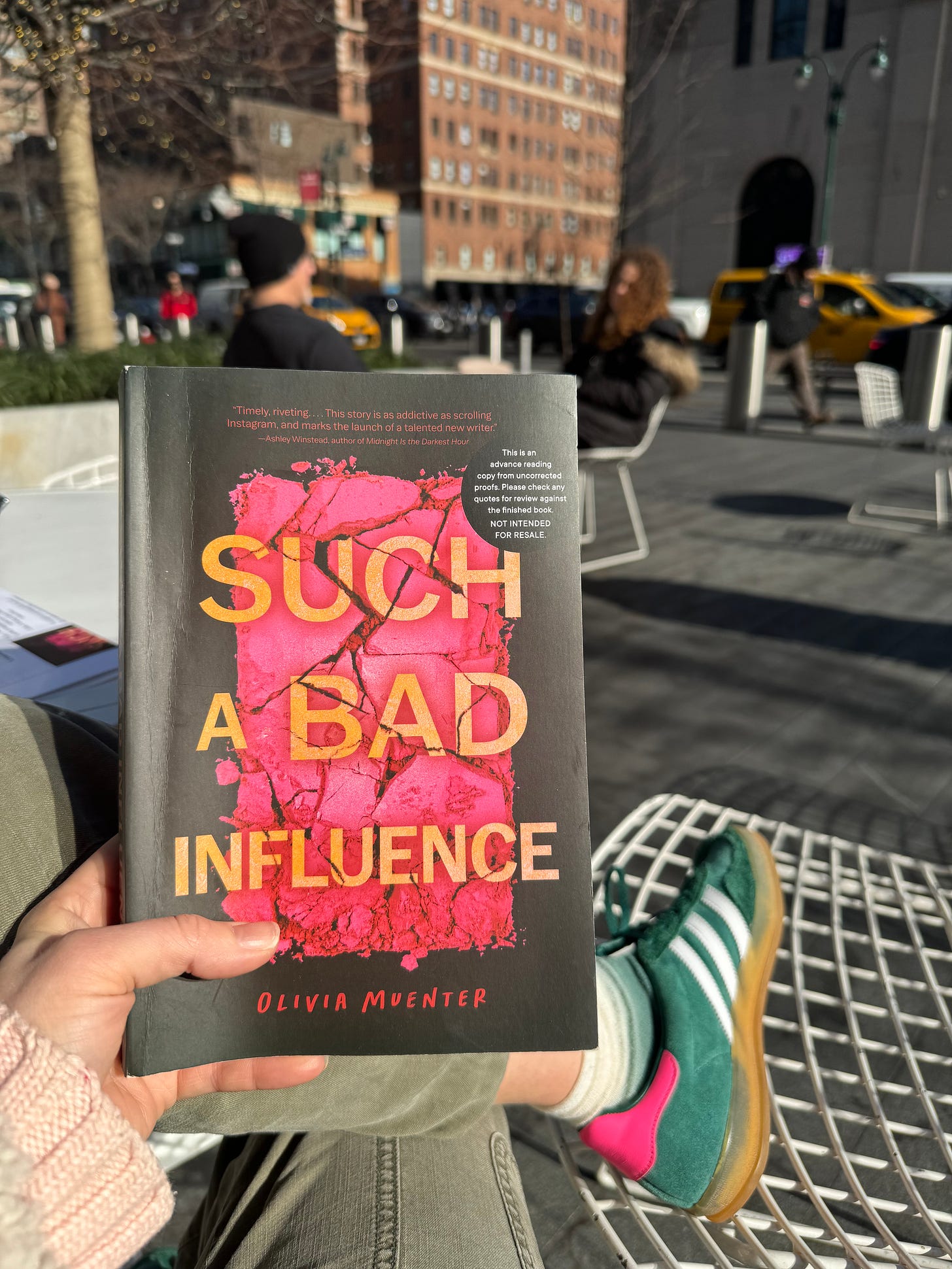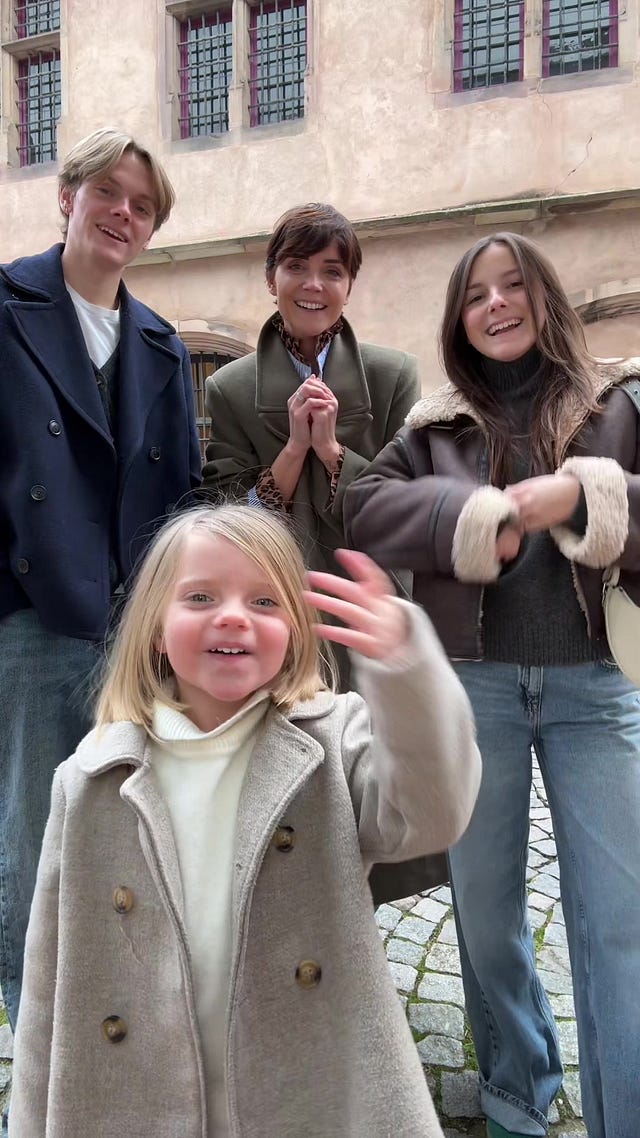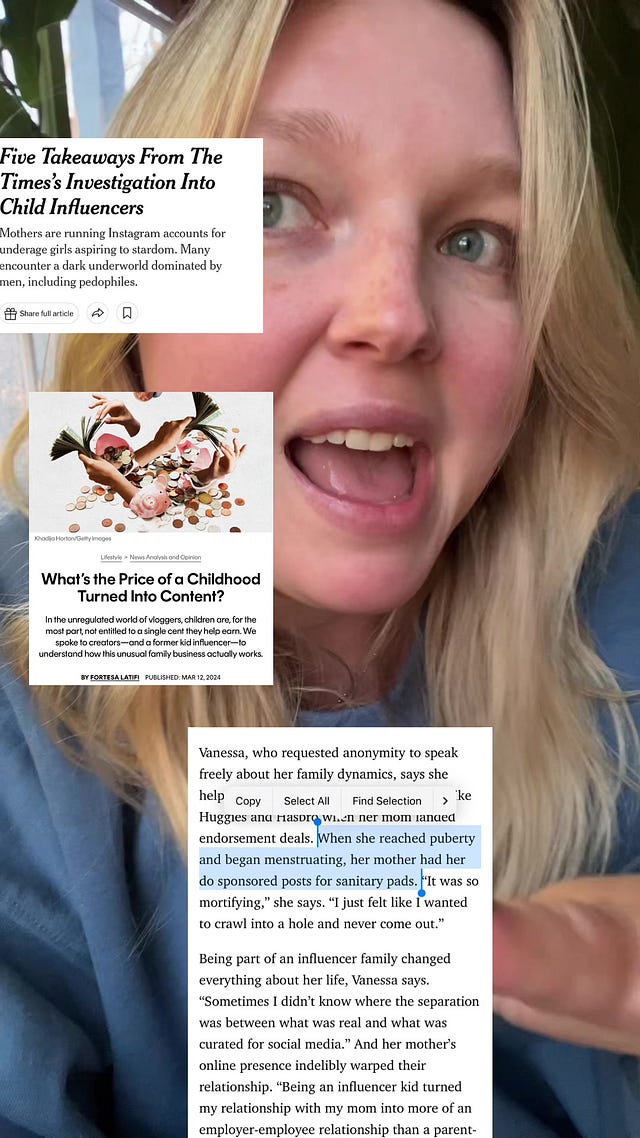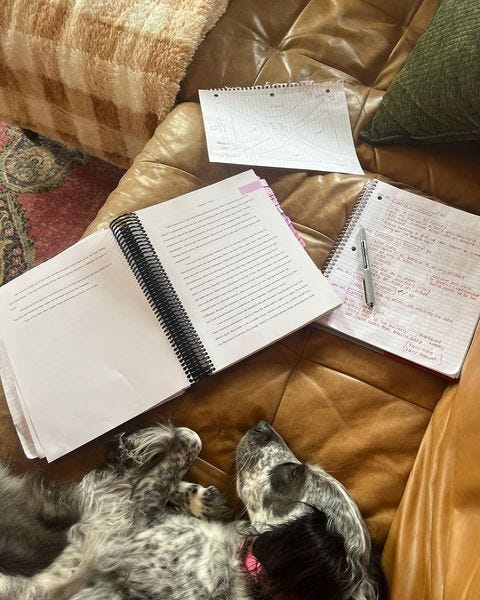thoughts on kids-as-content and people-as-brands
plus, a Q&A with Olivia Muenter
hi friends!
what a week it was as we dove into all things spring, despite the weather in new york not even close to reflecting a dethawing. I took part in a beautiful practice at The Class on monday in addition to our usual saturday session with live drumming to welcome the new season. on tuesday, we went to Rebecca Serle’s launch for EXPIRATION DATES at The Strand! then, I rounded out the work week with a gorgeous dinner amongst fellow women in travel I adore at the Warren Street Hotel. yesterday, I did the appointment Olympics as I continue my forever spin on the hot girl hampster wheel: wax, eyebrows, mani/pedi, facial. oh, the joys of being a woman!!
this morning, I’m getting all packed up to head up to Wildflower Farms in the Hudson Valley for our annual planning retreat at work. in the past, we’ve done this trip as far as Hacienda Alta Gracia in Costa Rica, so it is refreshing to have it be just an hour and a half drive from the city. and how fitting to be talking about going upstate when today’s guest is Hudson Valley-based creative Olivia Muenter! can’t wait for you to dig into Olivia’s Q&A—including what her perfect Sunday in the Hudson Valley looks like—but first, a detour with some of my rambling thoughts about the internet.
Olivia’s debut, SUCH A FUN AGE, comes out June 4th, but book I had the chance to read an early copy last month, and its themes have stuck with me. as Olivia puts it, the SABI focuses on “the issues of kids-as-content and people-as-brands.” for anyone who spends a great deal of their time on the internet (who else is sooner to share unfettered access to their camera roll than come clean about their daily screen time?), it’s sure to spark some deep thinking about the type of content we consume, specifically from influencers whose kids star as primary focuses of their content.
as I was brushing my teeth last night brainstorming about what today’s newsletter had to say, one of my favorite TikTokers came up on my FYP (For You Page, for those not yet fluent in TikTok!): @mademoissellesoph is a French mom in the fashion industry who does addictive “look du jour” vids focusing on her chic fits and the stylish outfits of her three kids, two teens and her youngest who’s probably no older than six. her videos are captivating, inspiring, and a fun daily French immersion! but after reading Olivia’s book about a child of an influencer who’s essentially coerced into being in her mother’s camera lens to get brand deals, it has me thinking, is it ethical to post videos like this? and what about all of us liking, commenting and sending to our friends?? in the case of our “look du jour” family, the kids seem all too happy to be participating (example embedded below) but part wonders…are WE really the problem?
I’d be curious what your take on it is! realistically, I know I’ll still always stop my scroll to watch a funny or entertaining kid video, only to be a bit skeptical when I click on the creator’s page and it’s a slew of “organic” moments at home captured where the child is at main stage. these kids are performing for audiences of millions, peppered in with sponsored posts about the ARMRA Colostrum packets mommy can’t live without…now that they are cutting her big checks, that is. and this isn’t meant to be (entirely) snarky—although, I could happily live if I didn’t see one more sponsored post about a supplement that I need to take to debloat—it’s simply me trying to re-train my brain to stop mindlessly scrolling and think a bit more deeply about the motivations behind it all, and how engagement from viewers is what perpetuates the cycle.
I definitely don’t have the answers to all of this, just a lot of questions. so as I aim to spend just a fraction less time scrolling and more time listening and learning, I’m trying to get into a better podcast routine. my go-to’s include Bad on Paper with Olivia Muenter and Becca Freeman, Moms Don’t Have Time to Read Books with Zibby Owens, The Run-Up by The NYT, The Money with Katie Show, Be There in Five with Kate Kennedy, Second Life with Hillary Kerr, It’s Me Tinx, Poured Over by B&N, The Shit No One Tells You About Writing withThe Shit About Writing Team, and Pop Fiction Women by Carinn and Kate.
I know it already sounds like a lot of content to consume, but I was just telling Morgan Pager on Friday (check out our Q&A here if you missed it) how I’m in my podcast flop era and looking for some new ones! she recommended some solid ones, including Hot and Bothered to switch up my listening. can you do the same and recommend some shows to get me out of my podcast rut? I would love to hear your favorite pods (book-related or not!) in the comments! xKD
meet Olivia Muenter
Olivia Muenter is a writer, reader, and the co-host of the Bad on Paper podcast. In her free time, you can find her watching bad television or working on her old house in the Hudson Valley where she lives with her husband and dog.
Kayla Douglas: Olivia, can you tell us a bit more about your origin story? Did you always know you wanted to be a writer?
Olivia Muenter: I always knew that I loved to write, but I think I struggled to envision how that would fit into a "real" career. Being an author or a full-time writer in any creative sense just felt really, really far-fetched to me when I was growing up — more like something you'd see in a movie than an actual option that was available to me. I studied journalism in college and then spent four years working as a fashion and beauty editor in digital media before going freelance. Officially working for myself and writing so many different types of stories helped me feel more confident to continue to shape my career into what I wanted it to be. Somewhere along the way, I started experimenting with writing fiction for fun and just really fell in love with it.
KD: In 2020, you embarked upon your journey to becoming a published author. Tell us about the premise of your debut, SUCH A BAD INFLUENCE.
OM: SUCH A BAD INFLUENCE is all about what happens when an influencer who has grown up online goes missing, and her older sister's search to find out what happened to her. It explores the issue of kids-as-content and people-as-brands, as well as the impossible goal of authenticity in a space that is all about curation.
KD: How has your work in the influencer space guided your writing of SABI, specifically as it relates to influencers’ children growing up with a lack of autonomy on how they are portrayed online.
OM: I don't have children, so it's important to me that parents don't read this and think this is some moral directive about how to raise kids the "right" way. I don't claim to have those answers. However, I do have experience with being on social media and being in control of all of it myself and you know, weirdly enough, even that is sometimes hard. I consider myself someone who has a realistic view of social media and influencing. I know what's going on behind the scenes, I know how much I do and don't share.
I know that when you follow someone you are only seeing a sliver of what's going on, and almost never the truly difficult, ugly stuff. I know that what strangers think about you doesn't matter.
And yet, even as an adult who's been doing this for a while, I find it all very difficult to manage (and impossible to quit). I've gotten better at it over the years, but it still is something that can affect me negatively if I'm not careful. I've been on Instagram for a little more than a decade now, a third or so of my life. When I imagine what it would be like to have an Instagram following for all of my life, to never have known a world without it, to have grown up with a following... that is a terrifying premise to me. And that's the perspective from which I wrote SABI.
 Tiktok failed to load.
Tiktok failed to load.Enable 3rd party cookies or use another browser
KD: The writing and editing parts of the process are distinct—some writers enjoy the creativity that comes with ideation more, while others thrive in the polishing phase. Did you gravitate towards one more than the other?
OM: I tend to write first drafts with themes and ideas in mind first, then plot, which is very fun but often makes the editing process a little more daunting. However, once I'm over the mental hump of 'how the hell am I going to weave all of this together' and in a good groove, I really love the polishing phase, too. There is nothing more satisfying than finally fixing the thing that isn't working, or making two scenes click together in just the right way.
KD: What was the most difficult part of bringing SUCH A BAD INFLUENCE into the world? The most rewarding?
OM: The most difficult part of the process was the same thing that's difficult to me about any writing I do — not letting my own self-doubt prevent me from doing the work. When I'm writing or editing, I'm happy. It might be challenging or difficult or agonizing work, but there is no work I'd rather be doing. I always know that. Outside of that work, though, it's easy for me to spiral, and then to stop writing altogether because I'm convinced I'm terrible, a fraud, etc. The most rewarding part has been sticking with something for so long, draft after draft, edit after edit, version after version.
I'm so used to just writing something and immediately sending it out in the world, but this was different, which I loved. Social media has trained my brain over the years to expect instant validation or response for anything I create. I didn't share anything about SABI for a really, really long time publicly, and the work was just as satisfying to me. That was a really lovely experience for me and part of why I hope I can keep writing books for a really long time.
KD: As a co-host of the Bad on Paper podcast, you're part of a thriving community of highly engaged readers. For someone who hasn't yet listened, what can they expect from BOP?
OM: I like to describe Bad on Paper as being part of a really fun book club where everyone actually likes each other. Yes, everyone there loves reading, and in most meetings, you talk about books at least a little bit, but ultimately you mostly just end up drinking wine together and eating snacks and discussing skincare and Pedro Pascal and Love Is Blind together, which is also pretty fun.
KD: You're a full-time writer, podcaster, and soon-to-be published author—many would envy this perceived flexibility, but there's also a great deal of self-discipline needed to go freelance. What advice do you have for someone who wants to work for themselves?
OM: My biggest piece of advice for anyone who wants to freelance is to check in with themselves regularly. Just because you set out with one image of yourself as a freelancer doesn't mean that can't change. I've been freelancing for five years now, and every year, the division of my income pie chart has looked different. Every year, I've had to reassess what was working and what wasn't, both financially and in terms of what I really wanted my career to look like.
KD: Tell us about the most recent work of fiction that left you with a book hangover.
OM: I can't stop thinking about Good Material by Dolly Alderton. It was really different than my usual taste (I tend to like darker books, thrillers, etc.), but I loved how creatively it explored a really universal experience (a breakup). Also, that last line! So good.
KD: What book is on your TBR that you're most excited to pick up?
OM: Speaking of darker things, I am counting down the minutes until I find the right moment to read Nightwatching by Tracy Sierra. Apparently, it's terrifying, but I've heard nothing but good things, and I'm so excited to be scared.
KD: The Sunday Series was conceptualized as a love letter to my favorite day of the week. If we were with you in the Hudson Valley on Sunday, where would you take us to spend the afternoon?
OM: The Hudson Valley is such a big place, but if you were around my neck of the woods and it was warm out, we'd first stop by Morningbird in Kinderhook for a gigantic latte (they have the biggest mugs I've ever seen, and I love them). Ideally, it would be farmer's market season so we'd peruse the various vendors, then head over to Kinderhook Books to pick up something fun. Finally, we could grab a beer and a cheese board from Saisonnier. And if we were really ambitious, we could round out the day by heading into Hudson to browse overpriced antiques.
KD: Your newsletter, Olivia’s Substack, is about writing, reading, and what it means to live an intentional life. Aside from staying in touch with you there, where else can readers follow along with your journey?
OM: I'm always on Instagram and occasionally on TikTok at @oliviamuenter! And, of course, you can listen to what's going on with me on weekly episodes of Bad on Paper.
We know how critical pre-orders are, especially for debut authors. When does SUCH A BAD INFLUENCE come out, and where can we pre-order it in the meantime?
OM: SUCH A BAD INFLUENCE is out on June 4, and you can pre-order from Amazon, Bookshop.org, Target, or anywhere else you'd prefer — landing page here. You can also always request that your local library carry it, or mark it as 'want to read' on Goodreads to show your support. I'm grateful for it all!









I know exactly which French influencer you describe above--and despite reading an ARC of SABI, being a mother myself (who would never put my son on a public social media account, and rarely even do so on my personal, locked down account)--I cannot unfollow her. What does that say about me?! Food for thought, for sure.
I have really strong feelings that kids are not content, but I've never put thought into whether people should be brands. Definitely worth thinking about! I was rattled to my core somewhat recently when I recognized a child in public that I have no business knowing. Quickly recognizing her baby brother too, and immediately thinking about how I could call those children by name chilled me. Anyhoo! Looking forward to reading SABI when it comes out this summer!